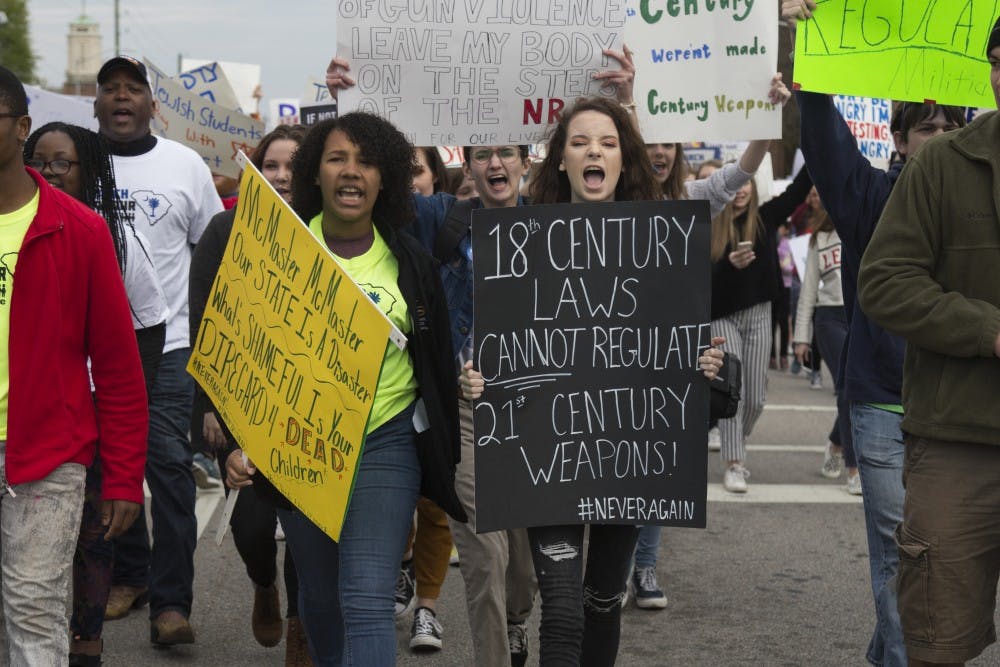For as long as we can remember, Americans have been protesting. These protests have shaped this country’s history and have represented both conflict and growth within our society.
When we think of traditional protests and marches, we picture large masses of people standing at the foot of their capitol building, hollering chants and holding witty signs. These are protests that we still see on a typical basis in America.
While protesting is nothing new, we seem to have entered a new era of doing so — one of fast national awareness and a collective bond between strangers with the same passions. So what does this new era mean for America’s protesters, and how will it change the course of history?
I started thinking about these questions after seeing the rapid and widespread preparation for the "Never Again" gun control movement. In less than six-weeks, the Parkland students behind this movement were able to pull off a massive march in Washington, D.C., as well as inspire marches all across the world. Political figures and celebrities were sharing their support for the movement, even if they were unable to attend the march itself.
One of the main differences between this protest, and contemporary ones just like it, and more historical ones, such as the civil rights and women’s suffrage movements, is the world’s access to social media. With platforms such as Snapchat and Twitter, protesters are able to share their thoughts and ideas on a public medium, allowing anyone and everyone to hear their voice.
On March 24, all social media platforms were filled with speeches, signs and conversations about gun control. People were sharing photos of themselves at local marches and were able to see other marches across the United States.
With the most recent election, there has been talk that social media has only furthered the divisive nature of politics. President Donald Trump’s tweets frequently cause social media uproar and can lead to heated political debates online. I’m not disagreeing with that fact that social media can cause some non-productive hostility online. But when used to its potential, these platforms give Americans the opportunity to be a part of a conversation they have never had access to.
What we tend to overlook is that social media has created a large and unified group that had not been possible until the advent of social media. The ability to express ideas online can connect people and give birth to collaboration that would be impossible without the tools of the internet. For instance, students in California can connect with students in South Carolina and collaborate on ideas and goals for their desired cause. During the civil rights movement, correspondence between those two groups would be either delayed, arduous or nonexistent.
The Parkland students used this to their advantage. After they announced their plan to march in Washington, D.C., on March 24, tweets were constantly sent out to gain support and awareness of their cause. Their reach is seen in the fact that, aside from the main march, there were more than 800 marches across the country.
Aside from the physical marches, there was a second wave of protest that allowed people to speak their minds without ever leaving their house. By sending out stories about and support for the "Never Again" movement, social media users were part of the march without even attending one.
Of course, the "Never Again" movement is not the first to use social media. Americans have been expressing their political and social ideas on these platforms as long as they have existed. What is different is the fact that it created a march aside from the physical one — one that took place on social media.
Is this kind of protesting lazy? Possibly. Will protesting on social media eradicate traditional and physical protesting? I couldn’t tell you. What I do know is that the creators and supporters of this march used social media to reach a wide swath of people and reached a level of organization that simply did not exist 20 years ago.
With this new kind of protesting, future political and social issues will be essentially impossible to ignore. The “ignorance is bliss” principle will basically disappear, and simply on the basis of having a social media accounts, everyone will be a part of the conversation.
Citizens are protesting louder than ever before. Not only can they chant in the street, but also have a voice right at their thumbs. America should prepare for even greater calls for change and unexpected collaborations from passionate citizens everywhere.

